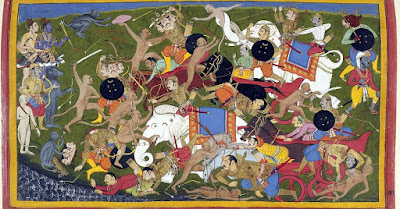POINTS TO REMEMBER IN ENGLISH LITERATURE - SERIES 1
INTRODUCTION
1. Piers finally appears as Jesus in Langland's Piers the Plowman. (PAPER 2, Q1,2004)
2. It was decided that each Canterbury Pilgrim will tell in all 4 stories. (PAPER 2, Q2,2004)
3. Shakespeare wrote the long narrative poem ' Venus and Adonis'. ( PAPER 2, Q3,2004)
4. The total number of poems in Shakespeare's Sonnet is 154. (P2,Q4,2004)
5. Christopher Marlowe (26 Feb 1564-30 May 1593)is also known as Kit Marlowe. He is the predecessor of Shakespeare and one of the most famous Elizabethan playwrights.
6. Michael Drayton( 1563- 23 Dec 1631 ) was an English poet of the Elizabethan era. He was the first to bring the term Ode for a lyrical poem.
7. Philip Sydney (1554-1586) belonged to the Elizabethan era. He is best remembered for his work The Defence of Poesy( also known as the Apology for Poetry).
8. Michael Drayton used the poetic name Rowland in his work Idea: The Shepherd's Garland published in 1593.
9. A Machiavellian hero/heroine is one who does what it takes to achieve his/her goal. The character generally lacks moral fiber.( PAPER2, Q5,2004)
10. Tamburlaine the Great is a play in two parts by Christopher Marlowe. It is partially based on the Central Asian Emperor, Timur the Lane(1405). (PAPER 2, Q5, 2004)
11. 'The Spanish Tragedy' was written by Thomas Kyd.
12. 'The Jew of Malta' by the Elizabethan playwright Christopher Marlowe opens with Machiavel, a ghost based on Niccolo Machiavelli. The main character of the play is Barabas, a Jewish Maltese merchant. The full title of the play is 'The Famous Tragedy of the Rich Jew of Malta.
13. 'The Tragical History of the Life and Death of Dr. Faustus' by Elizabethan dramatist Christopher Marlowe is based on German tales and the character Faust.
14. Edward Alleyn, the star actor of The Admiral's Men played the title character in the three plays by Christopher Marlowe: The Jew of Malta, Dr. Faustus, and Tamburlaine. After being a major figure in Elizabethan theatre, he founded the College of God's Gift in Dulwich.
15. Tamburlaine is the first play written in blank verse.
16. The full title of Edward the Second is 'The Troublesome Reign and Lamentable Death of Edward the Second, the King of England with the Tragical Fall of Proud Mortimer'. Christopher Marlowe found the material of the play in Raphael Holinshed's Chronicles (1587).
17. The play, Edward the Second ( has homosexual overtones. It focuses on the relationship between King Edward the Second of England and Piers Gaveston. A libel was published by Thomas Beard in 'The Theatre of God's Judgement' published in 1597.
18. Samuel Butler (1613-1680) is best known for his satirical work Hudibras. His poem was directed against religious sectarianism. He was influenced by John Skelton and Paul Scarron's work ' Virgil Travestie.' He borrows from Don Quixote too where characterization is concerned. (PAPER2, Q6,2004)
19. Religio Laici or A Layman's Faith (1682) is a poem written by John Dryden. It is written in heroic couplet. It was an answer to Father Richard Simon's defense of Roman Catholic tradition. However, five years later Dryden wrote Hind and the Panther( 1687), an allegorical poem in three parts to explain his conversion to the Roman Catholic faith.
20. Sarah Fielding (1710-1768) was the sister of English novelist Henry Fielding. She wrote under the pen name ' the author of David Simple.' The full title is,' The Adventures of David Simple in Search of a Faithful Friend.'
21.' The Governess or The Little Female Academy ' by Sarah Fielding was the first English novel to be written specifically for children.
22. The Blue Stocking Society was a women's movement in the mid-18th century. Its primary focus was the social and educational upliftment of women. It was established by Elizabeth Montagu and several others in the early 1750s.
23. Published after the English Civil War, Hudibras is a satire on the Puritanical sect. It is a narrative poem written in a mock-heroic style. (PAPER 2, Q6, 2004)
24. A narrative poem tells a story in the form of poetry. This form of poetry generally includes epic, ballads, idylls, lyric( a musical composition expressing personal feelings in the first person).
25. Mock-heroic style in poetry aims to mock or pull down the traditional characteristics of a hero by placing a fool or exaggerating it to the extent of absurdity.


Comments
Post a Comment